Every year, the College of the Holy Cross plants commemorative trees to honor some of our community members. In 2021, a tree was planted for Jim Long and a second tree was planted for Donna Wrenn, both long-time employees of the College. These trees join the many others in the campus arboretum.
Monica Martinez ‘21 on Alternative Transportation Appreciation Day – April 21st
On April 21, 2021, the College of the Holy Cross will host an Alternative Transportation Appreciation Day (ATAD). You may be wondering what is alternative transportation? Why is the office of sustainability spending a day celebrating it? Alternative transportation refers to the different forms of commuting other than single-occupancy vehicles (meaning when one person drives in a gasoline-powered vehicle alone). Some alternative forms include walking, biking, using public transportation, driving an electric vehicle, and carpooling. Student and employee commuting produce 30 percent of Holy Cross’ carbon emissions. The goal for Alternative Transportation Appreciation Day is to bring awareness to options like carpooling incentives, public transit, and carbon footprints in order to encourage the Holy Cross community to try transportation alternatives to single-occupancy driving. By doing so, the office of sustainability hopes to reduce the College’s carbon emissions produced through commuting.
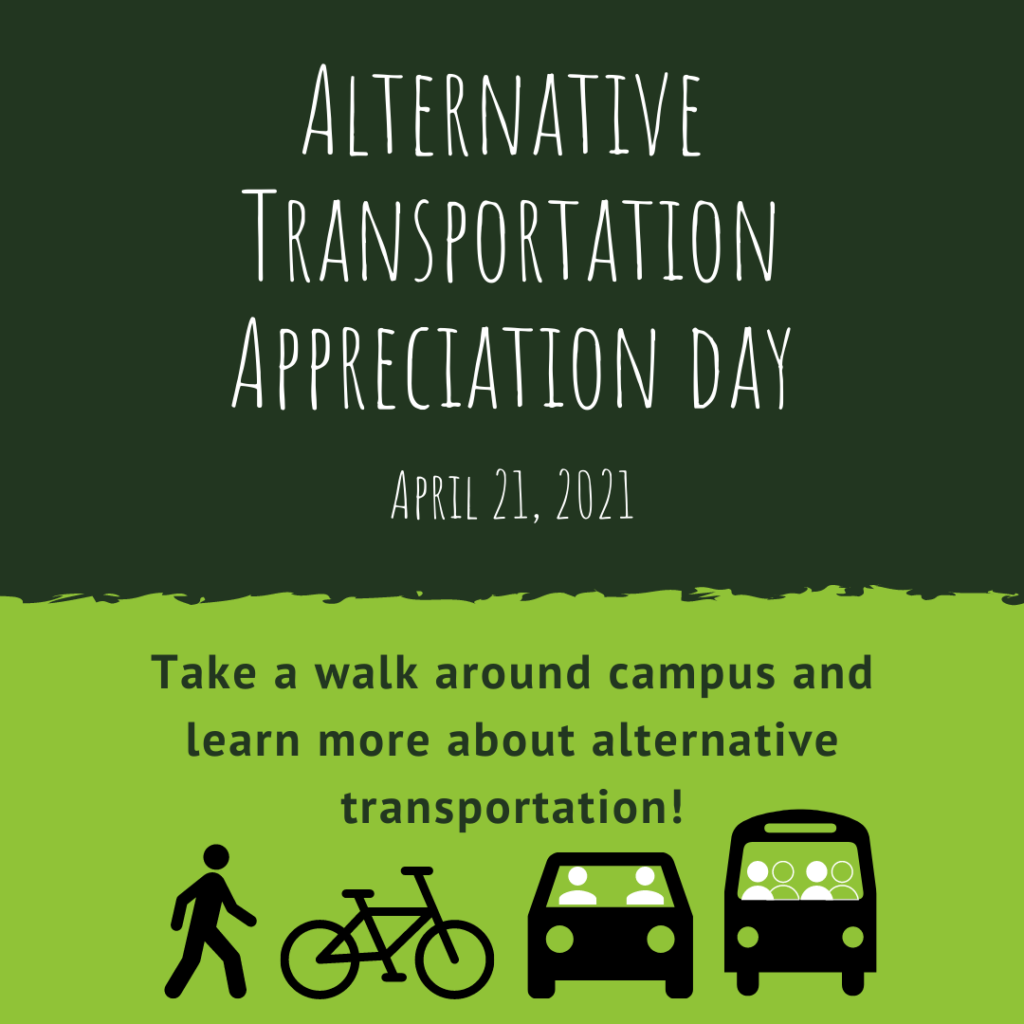
To support alternative transportation commuters, the College maintains a number of Electric Vehicle (EV) charging stations, exclusive hybrid vehicle parking spaces, and bike racks. Four dual-dual port EV charging stations are located on the third and fourth floors of Holy Cross’s parking garage. Highly desirable parking spots, exclusively for hybrid vehicles, are spread throughout campus parking lots, everywhere from Hogan Campus Center to Figge Hall. Uncovered bike racks are situated on the corner of Linden Lane and Kimball road, between the Science complex and Dinand library, as well as on each side of the Hart Center. Try to keep these locations in mind as they will be useful for ATAD activities.
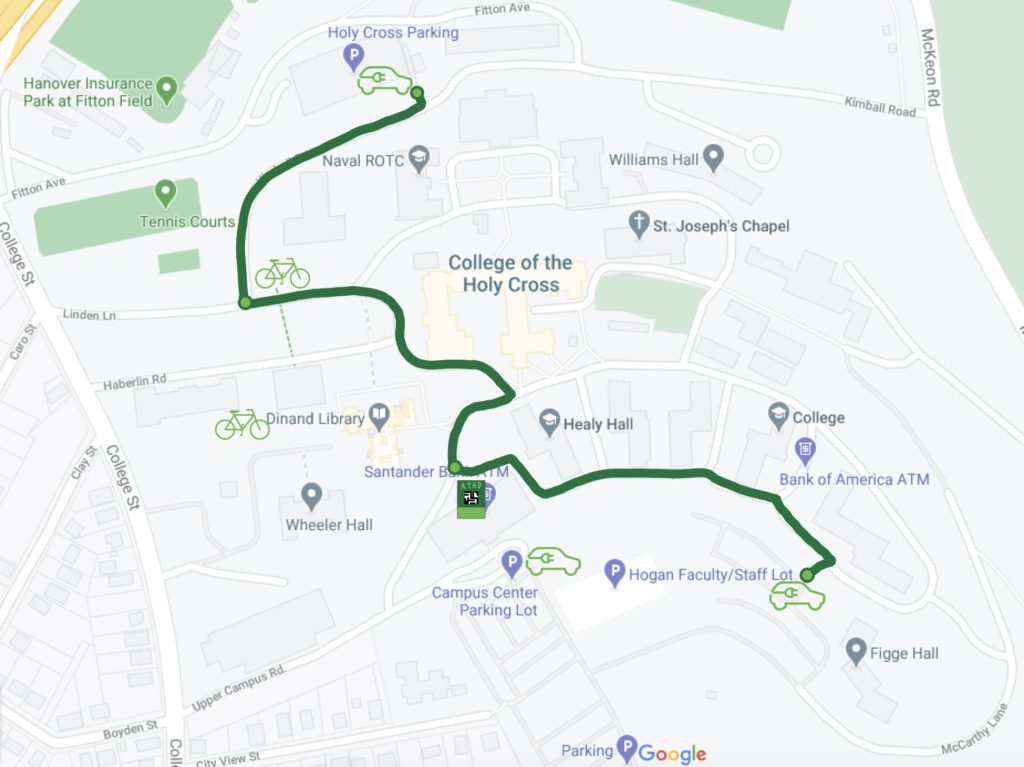
As mentioned earlier, ATAD will take place on April 21, 2021 and encourages people to enjoy the outdoors while staying socially-distanced. Participants will find green posters with QR codes in various locations on campus (see the map). The QR codes direct students and employees to infographics about public transit, to a site where they can calculate their carbon footprint, and to the app store where they can download the Baystate commute app. Happy ATAD!
The Relationship Between Sustainability and Residential Life with HRA Nelson Martinez De Los Santos ‘22
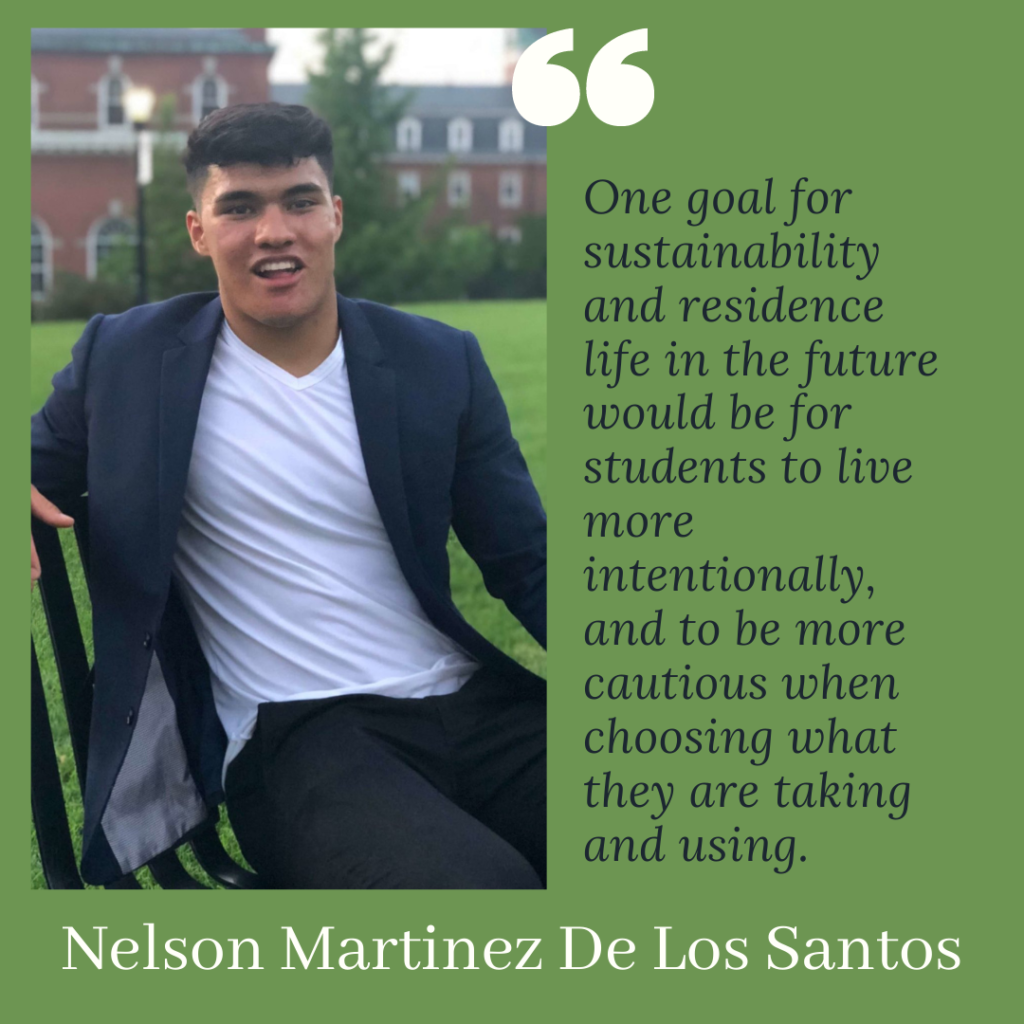
Sophie Haywood ‘21, Office of Sustainability intern, sat down with Nelson Martinez De Los Santos ‘22, RHA of Alumni Hall, to explore how sustainability integrates into living in a residential hall.
Q: What compelled you to become an RA?
Nelson: Community building was the main reason I wanted to become an RA. I felt that I could have had a better first year if my RA was someone that I could turn to whenever I felt like I needed somebody to hang out with or confide in. I felt like I needed a mentor to help guide me because I did feel a little lost as a first generation latino student from the west coast that was going to a predominantly white institution on the east coast. I came to the conclusion that I would try to be that person for first years could look to, and that is what made me want to become a first year RA.
Q: What about sustainability interests you?
Nelson: Growing up in Arizona I saw a lot of solar panels, so it was something that was always on my mind. The ability to make energy out of natural sources, such as sun and wind has always been really cool to me. As a vegan, sustainability is a big part of why I decide not to eat meat because I don’t believe it is an efficient use of our resources. Personally, living sustainably is just how I live.
Q: What is one green behavior that you have seen students doing well in your residence halls already?
Nelson: Recycling! I have been seeing a lot of students recycling this year, and have not seen very many trash on the floors or outside of residence halls. I have also seen students cut back on food waste. With Kimball giving out portions now, I have seen students eat most of their food which is a good thing to see.
Q: In your experience, which kind of reslife programs have you seen students get the most excited about? What would be any advice you have to get students excited about the new Green Student Living Program?
Nelson: In my experience, students are the most excited about programs that give out free food, or do something for the student that interests them. They also get excited when they are doing something active that gets them involved in the community. For students to get excited about the Green Student Living Program, they need to understand why they are doing it. Physical representations of the impact that they have are important because many times, students have to see it to believe it. If it is something that students care about, students will respond better to it.
Q: Do you have any goals or ideas for collaboration with the sustainability department and the residential life in the future?
Nelson: One goal for sustainability and residence life in the future would be for students to live more intentionally, and to be more cautious when choosing what they are taking and using.
The Relationship Between Sustainability and Residential Life with HRA Hannah Baker ‘21
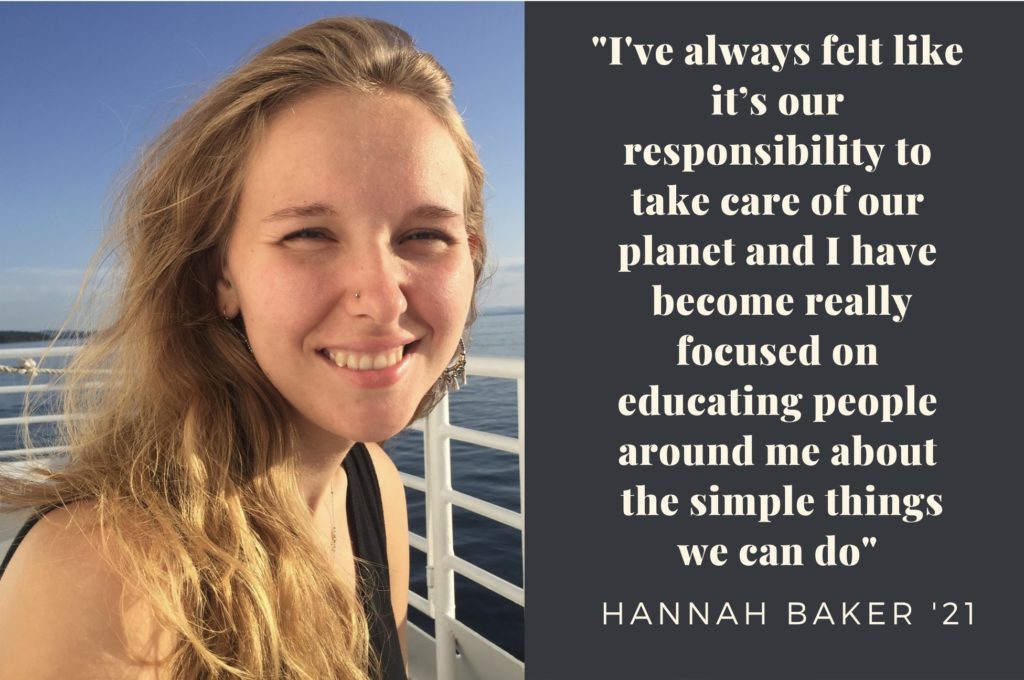
Sophie Haywood ‘21, Office of Sustainability intern, sat down with Hannah Baker ‘21, HRA of Williams Hall, to discuss the relationship between sustainability and residential life.
Q: How many years have you been a part of reslife here at the college?
Hannah: I was hired as an RA at the end of my first year and began sophomore year. Then junior year I became a head RA, which I am doing this year as well. During my sophomore year, I was an RA in Brooks-Mulledy. I then lived there as a junior as well, as I was the HRA of Brooks-Mulledy. I’m currently working as the HRA of Williams.
Q: What compelled you to become an HRA?
Hannah: I loved working as an RA because I got to reach a group of residents who were just beginning their time at Holy Cross. I felt that as an HRA I would have even more opportunities to connect with first year students and help them with this really important transition. I also just loved the experience of being on an RA staff. My staff had a really great connection during my first year as an RA, and I attributed our great dynamic to our HRA. I hoped I could create the same sort of positive work environment on a staff of new RAs if I became an HRA.
Q: What about sustainability interests you?
Hannah: I’ve always felt like it’s our responsibility to take care of our planet. I don’t really know how that started — I think it was just growing up in Vermont and never really giving things like recycling a second thought. It was just what we did, and I knew it was important so I did it. Then as I grew up I started to see how that wasn’t really as common everywhere else in the world. I have become really focused on educating people around me about simple things we can do, like composting and reducing plastic waste.
Q: Have you been involved with environmental programming/ taken any relevant courses/ or learned about sustainability in any capacity while at Holy Cross or elsewhere?
Hannah: I led some book talks on The Uninhabitable Earth for the Montserrat clusters in Brooks-Mulledy when I was the HRA there, since that was the first year book for 2019-2020. I’ve taken an environmental studies course and been an active participant in the sustainability-focused initiatives at Holy Cross. I also participated in the climate strike last year, which was so exciting. I participate in Plastic Free July every year, which is a really cool initiative that challenges people all over the world to be more mindful of how much plastic is a part of our everyday lives and then to make changes to that.
Q: What is one thing you would like to see change in your residence hall in the future?
Hannah: I think a big one would be installing more reusable water bottle fillers. If we could have more refill stations in residence halls, students would be less likely to buy the plastic water bottles in the lobby shop. Anything that is going to make the lives of residents easier.
Q: Do you have any goals or ideas for collaboration with the sustainability department and the residential life in the future?
Hannah: Any sort of educational programming between sustainability and residence life would be awesome! We could make the first part educational and then the second part could be more interactive and could involve student input.
The Ciocca Center and the Office of Sustainability Launch the Pothos Project
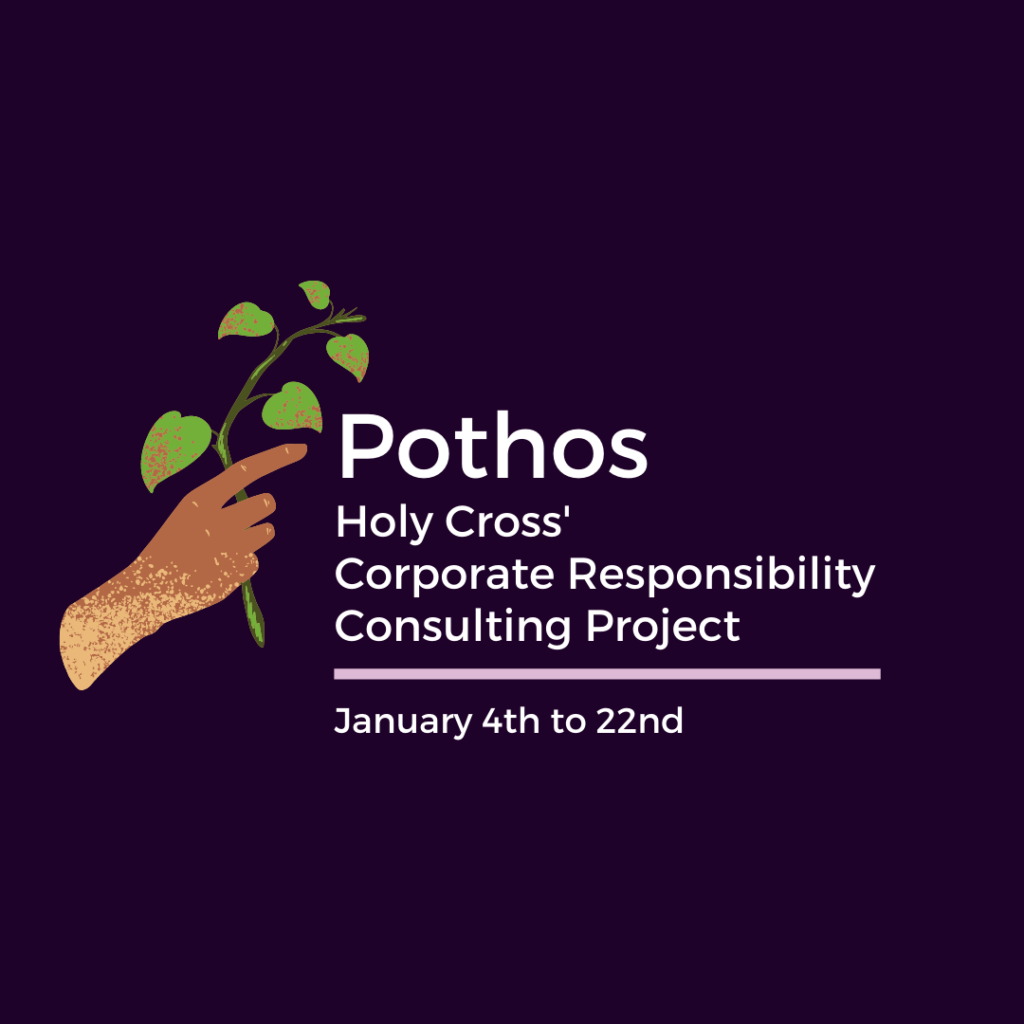
Pothos plants often symbolize determination, perseverance, wealth, and good fortune. The pothos plant thrives under challenging circumstances, making the most of limited resources like light and water, and its heart-shaped leaves clean the air. The pothos plant improves its environment while ensuring its own growth and flourishing. The new Pothos Project provides students with the opportunity to help Holy Cross and our local business community do the same; become more sustainable on their way to wealth and good fortune.
The 2021 J-term Pothos Project pilot gave students the opportunity to practice real-world corporate responsibility consulting, in partnership with Holy Cross’ Lobby Shop, and under guidance from Holy Cross alumni. During the first week, students attended three hour-long interactive sessions with HC alums (Cole Worthy ’88, Megan Skwirz ’12, and Jereme Murray ’15), learning about the consulting field and picking up some of the skills and tricks needed for the job. In the second week, students worked directly with the Lobby Shop to analyze how the store can advance their operations more sustainably. Throughout the final week, students presented their recommendations to their campus partner and met with alumni mentors who offered guidance and support.
This pilot project was co-sponsored by the Ciocca Center for Business, Ethics, and Society and the Office of Sustainability with the intent to expand the project in upcoming semesters.
Easily Donate Used, Unwanted Clothing and Household Items Behind Alumni Hall
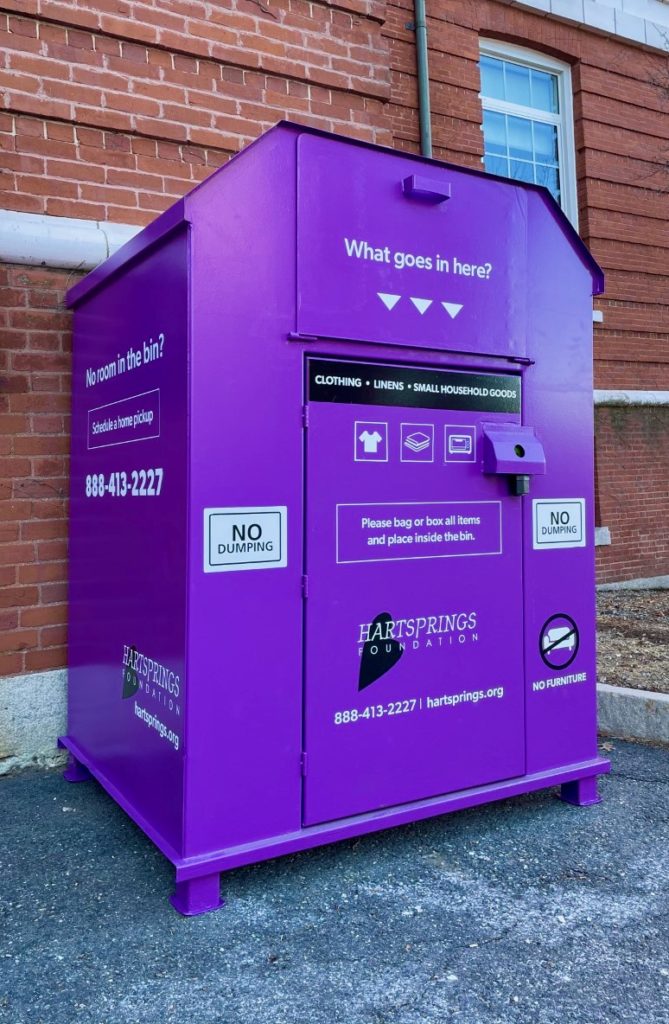
The Holy Cross community can now donate used, unwanted clothing and household goods to Hartsprings Foundation via an on-campus collection bin behind Alumni Hall.
Founded in 1997, Hartsprings Foundation “collects used, unwanted clothing and small household items on behalf of Big Brothers Big Sisters mentoring programs in Massachusetts and Connecticut.” Savers thrift stores purchase the donated goods from Hartsprings Foundation, providing revenue to financially support six Big Brothers Big Sisters mentoring program locations. To date, Hartsprings Foundation has raised millions of dollars, which has helped more than 2,500 at-risk children form meaningful 1on1 relationships with mentors.
Beyond Hartsprings Foundation’s financial support to change children’s lives for the better, the collection and redistribution process of usable clothing and goods reduces the amount of material entering the waste stream, which directly supports environmental stewardship. As the College works toward its Carbon Commitment, producing net zero carbon emissions by 2040, our participation in this process will lower the amount of trash the College produces, consequently reducing carbon emissions.
Participation is easy. Simply bag any donations and place the bags into the designated bin 24/7.
Items Accepted:
- All cloth items
- Clothing (All sizes, styles, ages, and genders)
- Bedding and Draperies (No bed pillows)
- Shoes
- Small appliances
- Electronics
- Kitchenware
- Household goods
- Sporting goods
- Toys
- Books (No encyclopedias, textbooks, or library books)
Climate Resilient Everyday Short Story Contest
Everyday, ordinary people are making decisions to fortify their livelihood and personal values against the possible negative impacts of climate change – The family making an emergency kit with essential supplies for an upcoming extreme weather event; the teen lobbying for an idling truck policy to limit poor air quality days; the employee participating in an earthquake drill. What does climate resilience look like in everyday life? The Holy Cross Libraries and the Office of Sustainability invite you to submit a short non-fiction story to the 2021 Climate Resilient Everyday Short Story Contest. Let’s explore how everyday people are demonstrating climate resilience and let’s amplify those voices.
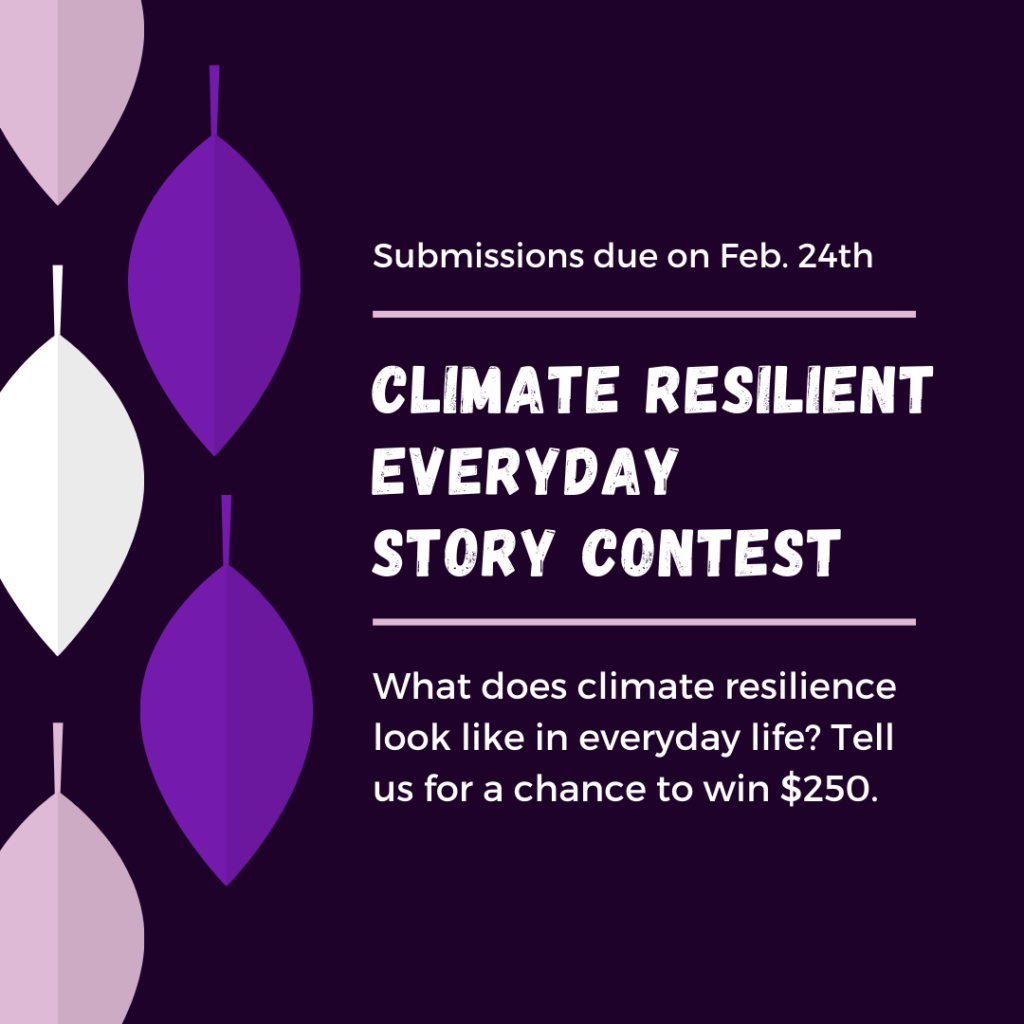
Eligibility
All College of the Holy Cross students, alumni, faculty, and staff as well as anyone holding a Holy Cross Libraries card are eligible to participate.
Need a library card? Library cards are generally issued at the discretion of the supervisor on-duty, primarily to Worcester area clergy, Nativity School teachers, other Worcester-area school teachers, members of the Worcester Institute for Senior Education, and members of the American Guild of Organists. The HC Libraries’ ability to issue new cards may be limited due to COVID restrictions. Learn more about library access.
- Short stories must be non-fiction and somehow answer the question, what does climate resilience look like in everyday life? Personal stories or stories about others are accepted.
- Participants must complete the digital submission form and may only submit one story. No paper entries will be accepted.
- Stories must be original and previously unpublished, including online blogs. Stories used for course or work assignments may be submitted as long as they were not published elsewhere.
- Please submit non-fiction stories with 1,500 words or less, in Times New Roman font size 12 and one-inch margins. Single, 1.5, or double spacing are all accepted. The title of the story should be in the header of each page, and stories must be written in English.
Notification of the Winner
The winner will be notified by Holy Cross’ director of sustainability by mid-March. All contestants will be notified shortly thereafter, via the email address provided during submission.
Award
The winning story will get added to CrossWorks, Holy Cross’ open access institutional repository. In addition, the contest winner will receive $250 and an announcement on the Libraries’ Newsfeed.
The Climate Resilient Everyday Short Story Contest is financially supported by a grant from the Resilient Communities program within the American Library Association.
Submission Due Date: February 24, 2021
Sara Axson ’21 Provides Tips for a Green Move-Out
It is almost finals season, which means a few things: cramming for final exams, preparing for the holiday season, and rushing to move out of dorms and off-campus apartments before we head home for winter break. Typically, many students throw out items from their dorms or apartments as they head home for winter or summer break. Are you looking to make your move out more sustainable? Here are some tips!
Invest in reusable boxes, containers, and shipping materials
Investing in reusable boxes and containers is a great way to decrease waste. Instead of buying cardboard boxes, invest in reusable containers. Not only will this save you some money down the road and decrease waste each time you move in or out of a dorm or apartment, but they also double nicely as dorm or apartment storage. For wrapping breakable items, look into sustainable wrapping materials. For instance, check out paper. For a zero-waste option, consider using blankets, scarves, or towels as wrapping materials.
Donate any leftover non perishable food items
Have any leftover cans of soup or ramen noodles sitting in your room or apartment? Instead of letting them sit there over winter break, donate them to a local food pantry. Instead of throwing them out, giving them to a shelter or food bank ensures not only that they do not go to waste, but that they go to someone who needs help, especially as we approach the holiday season. In other words, this is a great way to help your community and practice sustainable habits at the same time! Here are two local non-profits in the Worcester area that are accepting non-perishable food item donations: The Worcester County Food Bank and St. John’s Food for the Poor Program .
Donate gently used dorm items and clothing that you don’t need anymore
About to throw out your dorm lamp that doesn’t fit in the car? Don’t! Instead of throwing out gently used dorm items and clothes, consider donating them to local charities or thrift shops. This is a great idea for students living both on or off campus. Items being collected include gently used clothing, furniture, wipes, and books.
Recycle
It may seem simple, but it is super important: recycle, recycle, recycle. Make sure that you recycle any recyclable items or materials instead of throwing them in the trash.
Composting at Williams Hall and Figge Hall
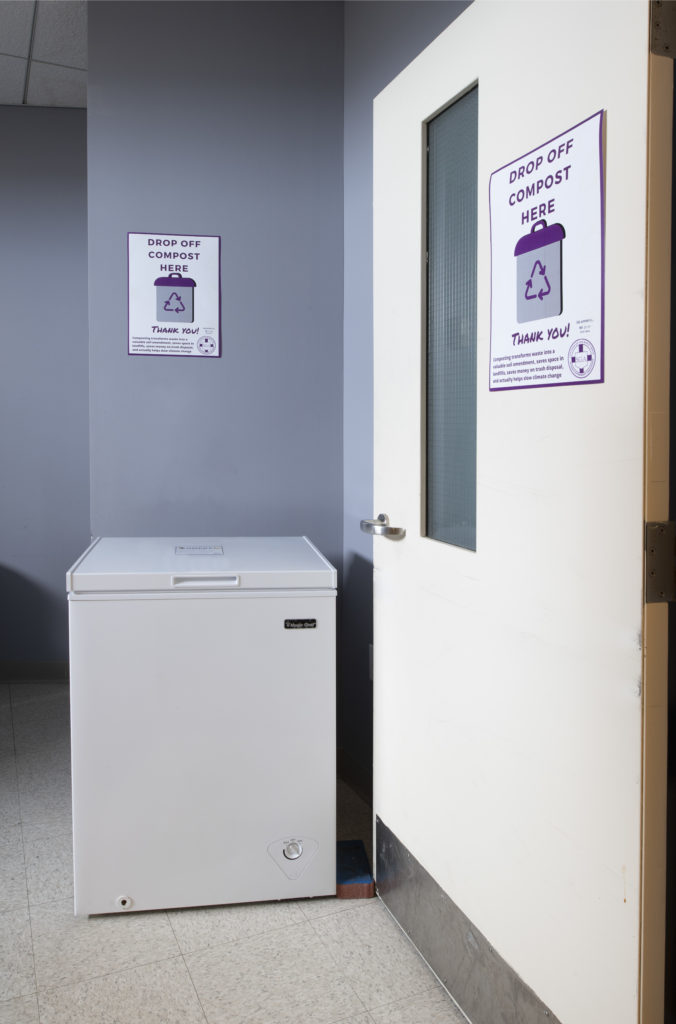
Even with careful thought and passionate execution, some sustainability projects take more than one trial to get right. For instance, the innovative freezer system used at Williams Hall and Figge Hall took over two years to develop. During the first attempt, the Student Government Association co-directors of environmental concerns and Presidential Task Force on the Environment members installed an aerated static pile composting system right outside the two buildings. However, student residents solemnly participated because the system was located outdoors. Possibly worse, the Facilities Department received complaints about bad odors. The implementation team decided to conclude this first attempt and pivot the project to a different model.
Today, student residents at Figge Hall and Williams Hall may successfully compost their food waste through a compact freezer system. Instead of traditional indoor collection bins, students will find small freezers at the collection zones. These freezers require less frequent pickup and provide flexibility for changing demand. They also mitigate icky smells and increase user convenience. When students have food waste to discard, they simply place their waste in a bag into the freezer. An Environmental Services staff member then removes the waste and brings it to the compost compactor located near Kimball Hall. Holy Cross’ hauler, Waste Management, picks up the organic waste and turns it into rich soil.
While some projects happen rapidly, many others take time, trial and perseverance to implement. The freezer composting system at Figge Hall and Williams Hall exemplifies this process.
Kimball Trials Reusables and Takeout
When diners enter the Main Dining Room at Kimball this Fall, they will now use reusable to-go containers for takeout. Each student on a meal plan will receive one nine inch by nine inch container as well as one six inch by nine inch container, free of charge, when they visit Kimball each time this semester.
The best part? Dining Services will clean and sanitize the dirty containers; students don’t need to rinse them. Dining Services provides a clean container during each visit. Students return their containers to the Main Dining Room at Kimball at their own convenience.
This initiative builds on Dining’s consistent effort to exemplify and provide environmentally sustainable service. In 2009, the Main Dining Room at Kimball went ‘trayless,’ which saves over 900 gallons of water daily. Back of house composting dramatically expands waste diversion efforts and diners currently enjoy a styrofoam-free dining experience. The United States generates 80.1 million tons of container and packaging waste annually. By utilizing reusable containers at Kimball, Dining Services continues to offer exceptional dining services while exemplifying environmental stewardship.
Visit Dining Services for more information about sustainability initiatives.

